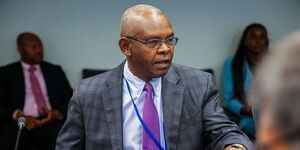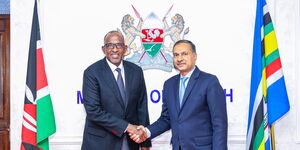The Ministry of Interior has moved to quell mounting unrest within the Kenya Prisons Service after delays in implementing a long-promised salary increase. The government's failure to deliver the expected pay rise has led to growing discontent among prison officers, some of whom had threatened to strike in protest.
A storm has been brewing within the ranks of the Kenya Prisons Service since July, when President William Ruto publicly promised a salary increment for all uniformed officers, starting with the July payroll. While police officers have already seen a boost in their pay, their counterparts in the prison service are still waiting. The delay has sparked frustration and anger, culminating in a go-slow by prison warders earlier this month.
The Principal Secretary for Internal Security and National Administration, Dr. Raymond Omollo, sought to clarify the situation on Wednesday, August 21, stating that the salary increases for prison officers and members of the National Youth Service (NYS) would take effect in September 2024. According to Omollo, the delay is part of a phased approach to implementing the recommendations of the Maraga Reform Taskforce, which are being rolled out across various institutions.
“Starting next month, September 2024, officers within the Kenya Prisons Service and the National Youth Service (NYS) will also begin receiving the increased pay as part of the Presidential directive on the expeditious implementation of the former Chief Justice (Rtd) David Maraga Reform Taskforce recommendations,” stated Omollo.
This announcement came after weeks of unrest within the prison service, where officers expressed their dissatisfaction with the government's handling of the promised pay rise.
Felix Koskei, the Head of Public Service, had earlier directed that all uniformed officers, from the lowest rank of constable, should receive a minimum monthly salary increment of Ksh4,000.
However, the directive, expected to be reflected in the July payroll, did not materialise for prison officers, leading to widespread discontent.
Despite reassurances from the President and top government officials, prison officers remain skeptical, with many questioning the government's commitment to addressing their grievances.
Officers who spoke anonymously to Citizen TV earlier this month, described the dire financial situation they are facing, with one officer lamenting, "We are yet to receive anything despite the promises to increase the salary."
The frustration has been compounded by the fact that their counterparts in the police service have already received their salary increments, leaving prison officers feeling overlooked.
Omollo confirmed that all police officers have received their pay rises, with constables enjoying a 40 per cent increase in basic salary, while senior officers received a more modest 3 per cent increase.
The reform process, as outlined by Omollo, is expected to take four years, from 2024 to 2028. It will be guided by a strategic framework focusing on leadership within the three services, oversight and accountability, institutional capacity development, human resource management, operational preparedness, and logistical capability. To ensure the seamless implementation of these reforms, Technical Committees on the Development of Legal and Policy Frameworks covering the three services have been established and officially gazetted.












